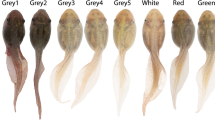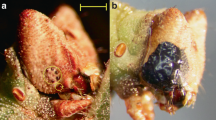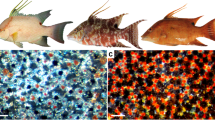Abstract
COLOUR change in response to environmental conditions has been described in the following groups: vertebrates, crustaceans, and certain molluscs. There are two types of mechanism by which rapid redistribution of the pigment in the skin is brought about. In molluscs, the pigment is contained in minute elastic bags, which can be expanded by means of a specially arranged musculature, and contract because of their own elasticity. In crustaceans and vertebrates, the pigment is present as granules inside stellate cells, and can migrate through the protoplasm, being either localised in the centre of the cell or distributed more or less evenly through its processes.
This is a preview of subscription content, access via your institution
Access options
Subscribe to this journal
Receive 51 print issues and online access
$199.00 per year
only $3.90 per issue
Buy this article
- Purchase on Springer Link
- Instant access to full article PDF
Prices may be subject to local taxes which are calculated during checkout
Similar content being viewed by others
References
Hogben and Slome, Proc. Roy. Soc., B, 108, 10; 1931.
G. H. Parker, Proc. Nat. Acad. Sci., 17, 594; 1931.
Author information
Authors and Affiliations
Rights and permissions
About this article
Cite this article
WELLS, G. Colour Response in a Leech. Nature 129, 686–687 (1932). https://doi.org/10.1038/129686b0
Issue Date:
DOI: https://doi.org/10.1038/129686b0
This article is cited by
Comments
By submitting a comment you agree to abide by our Terms and Community Guidelines. If you find something abusive or that does not comply with our terms or guidelines please flag it as inappropriate.



